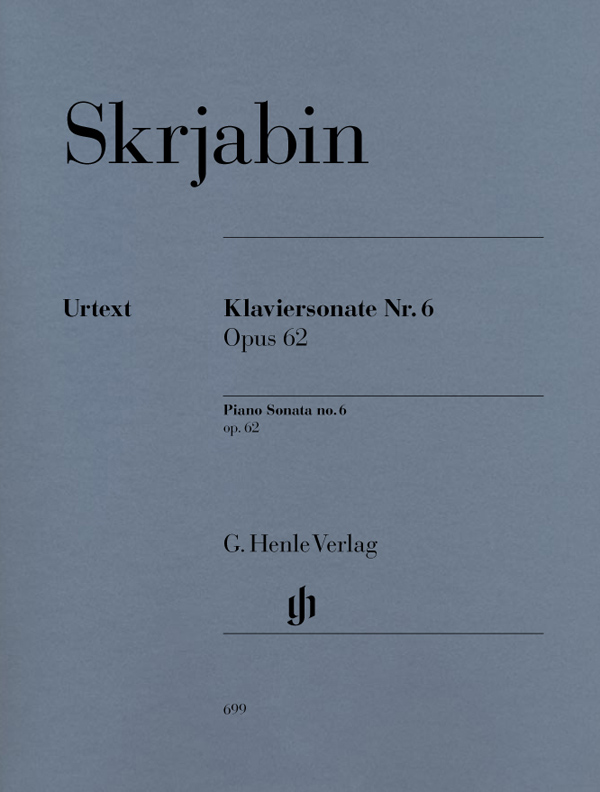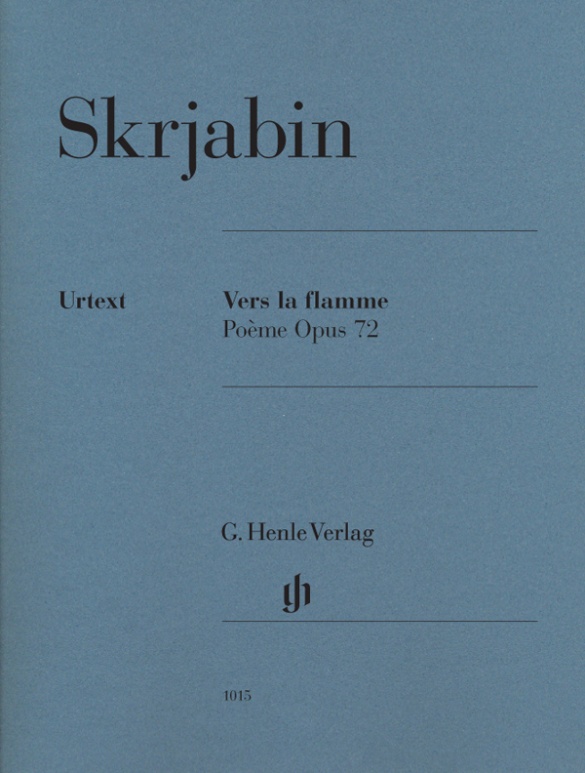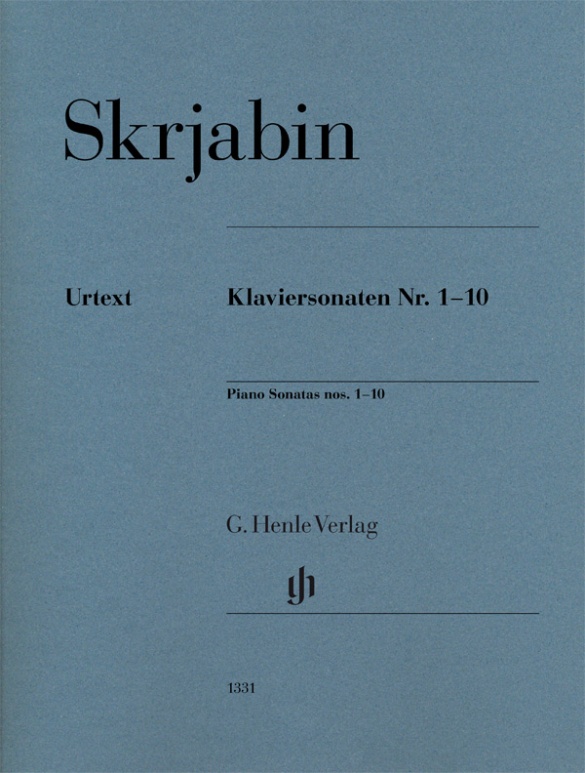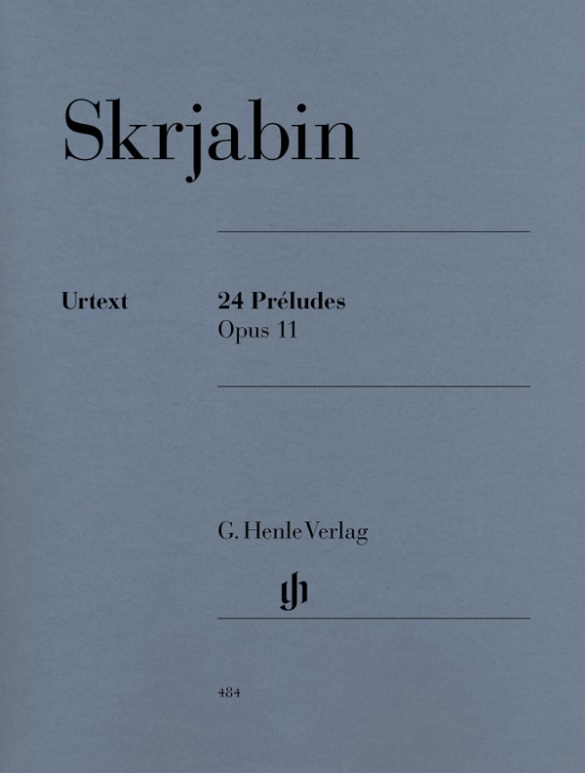Alexander Scriabin
Piano Sonata no. 6 op. 62
A work of transcendent beauty and rich programmatic allusions, Scriabin’s single-movement sixth Piano Sonata is a highly expressive product of the composer’s final outburst of piano music. This edition, by the renowned Skrjabin scholar Valentina Rubcova (Moscow), is based on the early printed editions and the composer’s virtually complete autograph manuscript.
Content/Details
(Explanation)
About the Composer
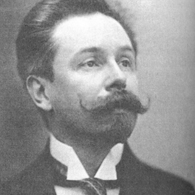
Alexander Skrjabin
Russian composer and pianist. The focal point of his oeuvre is his extremely unique piano music; in addition, he wrote important orchestral works.
| 1872 | Born in Moscow on January 6, the son of a pianist (his mother); she died in 1872. |
| 1888–92 | Piano studies at the Moscow Conservatory |
| 1888–96 | Twenty-four Preludes, Op. 11, containing all the hallmarks of Scriabin’s early period: broad, ornamental cantilenas underpinned by figurations and arpeggios in the style of Chopin, complex rhythmic structure from polyrhythms and syncopations. |
| 1892–1913 | Composition of ten piano sonatas. |
| 1896 | Travels to Paris, Vienna, Rome. |
| 1897 | Piano Concerto in F-sharp minor, Op. 20, in the style of Chopin. |
| 1897–1909/10 | He primarily composes orchestral pieces, including the major works “Le Poème de l’extase” (“The Poem of Ecstasy”) for large orchestra (1905–07), Op. 54, and “Prométhée ou Le Poème du feu” (“Prometheus or The Poem of Fire,” 1908–10); orientation toward Liszt and Wagner; programmatic music with occasional annotations in the musical score, incorporation of philosophical notions into his compositions, which are defined by various philosophical movements from around the turn of the century. Unusual intervals, harmonically at the edge of tonality. |
| 1899–1904 | Composition of his three symphonies, Opp. 26, 29, and 43. |
| 1904 | He resides in Switzerland. |
| 1906 | Invitation to the United States. |
| 1910 | Return to Russia. |
| 1908–10 | “Prométhée ou Le Poème du feu” for piano, orchestra, organ, choir, and clavier à lumière, Op. 60: enrichment of musical performance through plays of light. 1911–14, piano compositions, Opp. 61–74, with avant-garde harmonies. |
| 1913 | Beginning of the multisensory “Acte préalable” (“Prefatory Action”), which is never completed. |
| 1915 | Death in Moscow on April 27. |
About the Authors
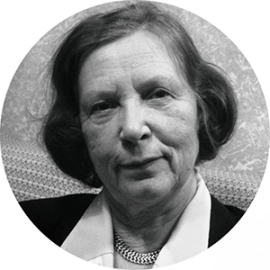
Valentina Rubcova (Editor)
Valentina Rubcova holds a doctorate in musicology, is editor-in-chief of the Moscow music publishing house “Muzyka – P. Jurgenson Publishing House” and deputy head of research at the Scriabin Memorial Museum Moscow.
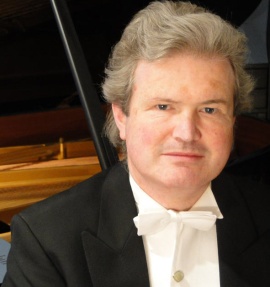
Michael Schneidt (Fingering)
Michael Schneidt, born in Munich, received his piano education at the Staatliche Hochschule für Musik und Theater in Munich, studying with Hugo Steurer and Klaus Schilde. He then completed his artistic state examination with distinction as well as his master-class diploma. He continued his education on a grant from the DAAD with Alessandro Specchi in Florence, also taking master-classes with Paul Badura-Skoda and Bruno Leonardo Gelber. Michael Schneidt has been a prize-winner at international piano competitions (1st prize Viotti-Valsesia, Italy), has done radio and TV broadcasts and also made CD recordings; he has also premiered many contemporary piano works. He has performed in Europe (e.g. at the Prague Spring International Music Festival and at the German Mozart Festival), in Japan and in South America.
Michael Schneidt is Professor of Piano at the Staatliche Hochschule für Musik und Theater in Munich. He has given master-classes in Germany, Switzerland, the Czech Republic and Japan, and is from time to time a member of the jury at music competitions.
Product Safety Informations (GPSR)

G. Henle Verlag
Here you can find the information about the manufacturer of the product.G. Henle Verlag e.K.
Forstenrieder Allee 122
81476 München
Germany
info@henle.de
www.henle.com
The 6th piano sonata was written in 1911 and was first published the following year. The present edition is based on corrections made to the first publication as well as an autographed manuscript of an early version of the work.
Sheet Music, 2001... on a retrouvé une version autographe, presque complète et cette dernière, outre l'édition Chiliaïev, a servi pour la présente édition afin d'éclaircir des passages problématiques. Les divergences des sources de correction sont notées et commentées - en anglais et allemand avec une traduction des indications d'exécution, précieuses chez Scriabine - en fin de volume. Enfin, l'éditrice, Valentina Rubcova (les doigtés sont de Michael Schneidt), a noté entre parenthèses ses propres ajouts.
Crescendo, 2001... , als je dit stuk snel moet instuderen, dan is die klaarheid welkom. En het werd wel tijd voor een goed leesbare uitgave van het stuk. ... Die leesbaarheid is bij Henle nooit een probleem en redactrice Valentina Rubcova heeft er goed aan gedaan het werk van haar voorganger Nikolai Shilyayev op de voet te volgen. ...
Pianowereld, 2001La Sonata n° 6, de Alexander Scriabin, forma parte de sus últimos trabajos para el teclado. Compuesta muy probablemente en 1911, editada un año después y estrenada el año de la muerte del compositor, 1915, esta Sexta Sonata conversa toda la potencia pianística de su autor y su gusto por el misterio. La impecable edición urtext de Henle restituye un material de calidad.
Doce notas, 2001推荐
autogenerated_cross_selling
本书目其他版本
本书目其他版本


